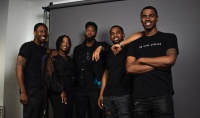Ogden Payne
Twitter/Instagram
@OgdenPayne
(Black PR Wire) It took Cam Kirk just one semester of biology to realize he didn’t want to become a doctor. Before the Morehouse grad established himself as one of the most sought-after photographers in hip-hop, he filtered through other career paths. Concert promotion seemed like a viable option after he successfully booked Wiz Khalifa for a show in Atlanta. But the decision to purchase a camera so he could better market future concerts and events was the catalyst behind his current role.
Building clientele was virtually effortless for Kirk. Within a month of his decision to become a photographer, he was tapped to capture ScHoolboy Q, Estelle, and Young Jeezy. His resume now includes snapping photos of hip-hop heavyweights such as Gucci Mane, 21 Savage, and Future. Two years ago, Kirk added to his business model by opening a photography studio.
Cam Kirk Studios operates differently than its neighboring tenants. Old signage from the Magic City strip club hangs on the wall left of the entryway – the club itself sits just across the street, its neon blue lights illuminate Forsyth Street each night. According to Kirk, the open-layout studio books over 400 appointments each month. Rappers, producers, photographers and miscellaneous creatives float in and out. Southern hospitality is packed between the exposed brick walls. Carving out a living as a full-time creative, as well as managing a studio with eight employees is just part of Kirk’s ventures. Now, he and business partner John Rose, an entertainment attorney by trade, are focusing their energy on the launch of Collective Gallery, a record label-style imprint for photographers.
“Collective Gallery is one hundred percent rooted in creating a better landscape for photographers,” Kirk said. “I wanted to build another complementary company that can further assist in my mission of sustaining the photography industry and help pass the torch to other creatives like me.” The company will function similarly to a traditional record label. It will sign, develop and help talent monetize their craft, from assistance with touring, merchandising, and content distribution. Portfolio submissions are open and a $20,000 advance will be given to their first signee. Deal structures will vary, but as a creative, Kirk has limited interest in perpetually holding hostage the rights of his creatives.
“Cam did a great job of teaching me that artists aren’t only rappers,” Rose said. “Photography is a form of art and that same art should be respected just like the rappers are.” Throughout his career, Kirk has been able to monetize off of his influence beyond his photography work, similar to the hip-hop artists he’s worked with. He has landed liquor endorsement deals with Avión, Martell, Jameson, and Glenlivet. He monetizes off of his creative projects and merchandise. Brands like Nike, Puma and more have trusted his artistic vision for their campaigns. Collective Gallery plans to use Kirk’s trajectory as the model for the creatives signed to the platform.
Finding opportunities outside of traditional work-for-hire contracts was an uphill battle early in Kirk’s career. Both Kirk and Rose recount the struggle of trying to find an agency willing to represent a hip-hop centric photographer. It wasn’t until recently that urban photography, as well as urban music, could be accepted as mainstream art. Gunner Stahl – whose photo reel includes The Weeknd, Chance the Rapper and Tyler, the Creator – leveraged his name into a self-branded concert. Anthony Supreme, a go-to photographer for Dreamville, parlayed his talents into the creation of Preme Magazine.
Collective Gallery’s expansion will be gradual. Kirk believes his experience accruing business for himself and overseeing the operations of his studio have sharpened his intuition as an executive. Rose hopes that the label will establish a new blueprint for creatives in all mediums to follow.
“The reason I wanted to become an entertainment attorney was to protect the art,” Rose said. “How I will measure success for the company is if the artists are well-protected.”
Cam added: “Whether we have one artist or one hundred artists, I want to make sure that the people we are responsible for have achieved what they set out to do, make sure that we’ve been a positive resource for them, and make sure that they are happy.”

